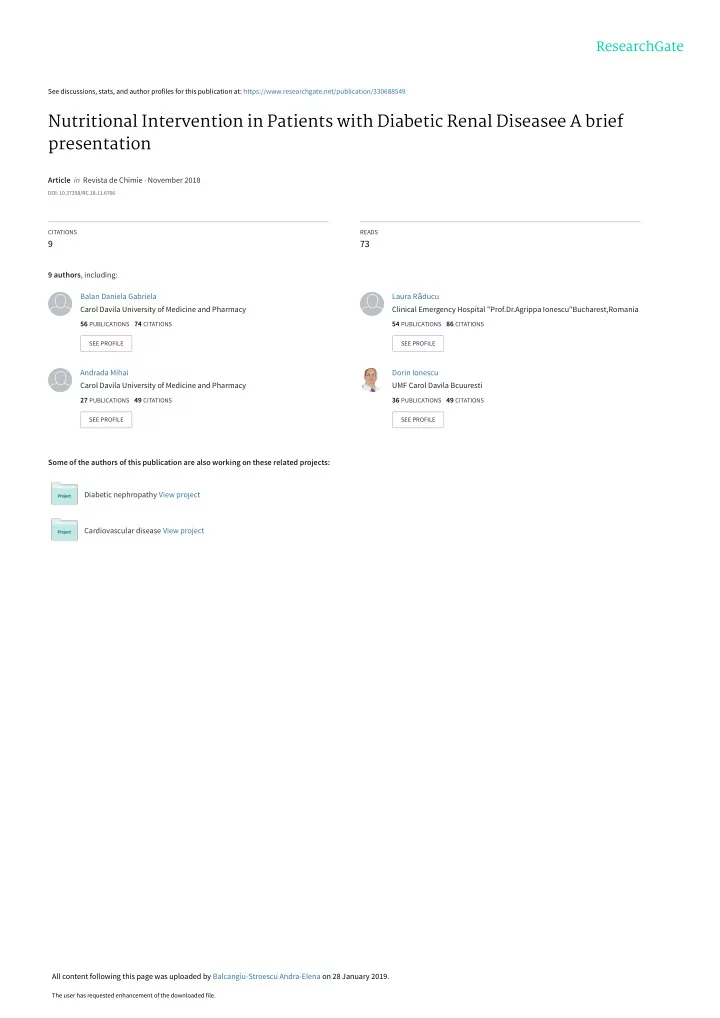

See discussions, stats, and author profiles for this publication at: https://www.researchgate.net/publication/330688549 Nutritional Intervention in Patients with Diabetic Renal Diseasee A brief presentation Article in Revista de Chimie · November 2018 DOI: 10.37358/RC.18.11.6706 CITATIONS READS 9 73 9 authors , including: Balan Daniela Gabriela Laura R ă ducu Carol Davila University of Medicine and Pharmacy Clinical Emergency Hospital "Prof.Dr.Agrippa Ionescu"Bucharest,Romania 56 PUBLICATIONS 74 CITATIONS 54 PUBLICATIONS 86 CITATIONS SEE PROFILE SEE PROFILE Andrada Mihai Dorin Ionescu Carol Davila University of Medicine and Pharmacy UMF Carol Davila Bcuuresti 27 PUBLICATIONS 49 CITATIONS 36 PUBLICATIONS 49 CITATIONS SEE PROFILE SEE PROFILE Some of the authors of this publication are also working on these related projects: Diabetic nephropathy View project Cardiovascular disease View project All content following this page was uploaded by Balcangiu-Stroescu Andra-Elena on 28 January 2019. The user has requested enhancement of the downloaded file.
Nutritional Intervention in Patients with Diabetic Renal Diseasee A brief presentation DANIELA GABRIELA BALAN 1 , ANDRA ELENA BALCANGIU STROESCU 1,2 *, MARIA DANIELA T ANASESCU 3,4 , ALEXANDRU DIACONESCU 2 , LAURA RADUCU 5,6 , ANDRADA MIHAI 7,8 , MIHAELA T ANASE 9 , IULIA IOANA STANESCU 1,10 , DORIN IONESCU 3,11 1 Carol Davila University of Medicine and Pharmacy, Faculty of Dental Medicine, Discipline of Physiology, 8 Eroii Sanitari, 050474, Bucharest, Romania 2 Emergency University Hospital,Department of Dialysis, 169 Splaiul Independenei, 050098, Bucharest, Romania 3 Carol Davila University of Medicine and Pharmacy, Faculty of Medicine, Department of Medical Semiology, Discipline of Internal Medicine I and Nephrology, 8 Eroii Sanitari, 050474, Bucharest, Romania 4 Emergency University Hospital, Department of Nephrology, 169 Splaiul Independenei, 050098, Bucharest, Romania 5 Carol Davila University of Medicine and Pharmacy, Faculty of Medicine, Department of Plastic and Reconstructive Microsurgery, 8 Eroii Sanitari, 050474, Bucharest, Romania 6 Prof. Dr. Agrippa Ionescu Clinical Emergency Hospital, Department of Plastic and Reconstructive Surgery, 7 Ion Mincu, 011356, Bucharest, Romania 7 University of Medicine and Pharmacy Carol Davila, Nutrition and Metabolic Diseases - N. Paulescu National Institute, Faculty of Medicine, Discipline of Diabetes,5-7 Ion Movila Str., 020475, Bucharest, Romania 8 Department II of Diabetes, Nutrition and Metabolic Diseases National Institute of Diabetes, Nutrition and Metabolic Disease Prof. N. Paulescu, 5-7 Ion Movila Str., 020475, Bucharest, Romania 9. Department of Pedodontics, Faculty of Dental Medicine, 8 Eroii Sanitari, 050474, 10 Carol Davila University of Medicine and Pharmacy, Faculty of Dental Medicine, Discipline of Biochemistry, 8 Eroii Sanitari, 050474, Bucharest, Romania 11 Emergency University Hospital, 169 Splaiul Independenei, 050098, Bucharest, Romania Clinical nutrition represents one of the main tools the clinician has to help prevent, control and in some cases, treat different diseases. In this context, diabetes mellitus is a disorder for which the nutrition plan is one of major importance, both in preventing the disease, as well as in its evolution. Thus, the complications that can occur during its progression represent one of the major stimuli to adjust the non-pharmacological treatment (the diet). In the initial stages of the disease, daily intake of carbohydrates monitoring and weight control of the patient are mandatory. Subsequently, the development of diabetic renal disease and diabetic nephropathy are important arguments in favor of daily protein intake adjustment in these patients. Keywords: diabetes mellitus, diabetic renal disease, diabetic nephropathy, proteinuria, hypoproteic meals and snacks, patients’ preferences and lifestyle The increased number of over 18 years old patients with should be taken into consideration [2, 3]. For a healthy diabetes mellitus in the past years has determined the lifestyle, daily carbohydrates consumption is advised to be registration in 2014 of a disease prevalence of 8.5%, monitored. The suggested carbohydrate sources for these especially in low or m edium incom e population. To patients are whole cereals, fruits, vegetables, as well as emphasize the magnitude of the problem, we specify that low fat milk products. The ingested quantity of lipids is in 1980 disease prevalence was 4.7% in the same category also important for cardiovascular involvement in diabetic of patients. The chronic complications surging during the patients. These aspects derive from the negative influence disease are the reason why diabetes m ellitus is an that the trans fats have on the cardiovascular health in im portant m ortality cause , in particular cause due these patients. By contrast, the fats provided by fish meat, cardiovascular involvement. This fact is sustained by the olive oil and seeds have a good effect on cardiovascular 2016 statistic that attributes 1.6 million deaths to diabetes health. Additionally, the current guidelines for patients with [1]. diabetes mellitus emphasize on the recommend quantity Managing diabetic patients first and foremost the correct of ingested sodium. In these subjects, it’s suggested that administration of the non-pharmacological treatment- the sodium intake should be limited to 2300 mg/day, and if the diet. In these patients, a properly lead nutritional intervention patient for whom the diet is proposed also has hypertension, contributes to a good control of the diabetes. This includes sodium consumption should be decreased even more. A maintaining normal levels for glycated hemoglobin, blood low quantity of carbohydrates from alcoholic beverages is pressure and LDL-cholesterol. In particular, in patients with allowed as well. Fiber consumption is also encouraged type 2 diabetes, the nutritional intervention implies in with a suggested ration of 14 g to each 1000 ingested addition to a meal schedule with a controlled calorie intake, calories [2]. a physical activity plan in order to obtain the optimal weight In type 2 diabetes, maintaining a normal weight of the [2]. patients is one of the main treatment strategy. Obesity conducts to type 2 diabetes and its association with the Experimental part diabetes mellitus occurrence enhances cardiovascular The design of the diet for diabetic patients, calories involvement. Besides a careful follow-through of calorie distribution and of micro- and macronutrients in main *email: stroescu_andra@yahoo.ro All authors contributed equally to the present work and thus are main authors REV.CHIM.(Bucharest) ♦ 69 ♦ No.11 ♦ 2018 3178 http://www.revistadechimie.ro
Recommend
More recommend